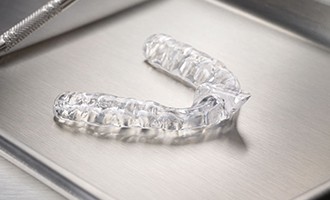
Bruxism is defined as excessive teeth grinding and jaw clenching. A large portion of the patient population deals with bruxism to some extent. You may have been asked at some point in your dental history if you’re aware of any grinding/clenching habits. Some people have had ongoing issues with grinding and subsequent jaw pain, some have no idea the damage that is happening while they sleep (or work).
The reasons for grinding and clenching are many and varied, but there are two main theories. The first is that we are using clenching and grinding as stress relief. Much like flexing and squeezing our hands and fingers when we’re upset, we clench our jaws and grind our teeth to release tension. The second is that bruxism is caused by an anatomical reflex to keep us breathing while we sleep. The jaw is very heavy and the tongue becomes very large when relaxed, both of these factors can lead to apneic (lack of breathing) events when we hit a cycle of deep sleep, so our bodies go into bruxism mode to move the jaw, tighten the tongue muscle and open the airway again. Both of these theories hold true for many patients, but now we have to consider the damage that is caused by bruxing.
Damage to your jaw joint and teeth. Years of clenching and grinding can cause flattened, worn teeth, that can crack and break. It can also cause enamel to break right at the gumline of a tooth from the excessive forces, damage known as an abfraction lesion. Both of these can cause tooth sensitivity from the loss of enamel, and can also lead to tooth decay by exposing the much softer, dentin layer. Also, by constantly working the jaw joint, the soft meniscus pad that protects the temporomandibular joint can be completely worn away, causing arthritis and severe pain in the joint.
You’re not getting the benefits of deep sleep if you’re grinding. When you hit the deepest cycle of sleep is when your body truly rejuvenates itself. Human growth hormone is released to help tighten the skin, reverse the aging process, improve our memory, burn fat and build muscle. Even if you’re getting 8 hours of sleep, if none of it is deep sleep, you are not getting quality rest. A lack of deep sleep puts you at higher risk for heart disease, high blood pressure, stroke, depression, anxiety and weight gain.
What options do you have then, to correct a problem you may not even consciously know you have?
During your biannual checkups and cleanings, your dentist and hygienist will evaluate the presentation of your teeth and TMJs. Appearance of the teeth and palpation of the jaw joints is usually enough to determine if a problem is evident. If you have any of the visual signs of wear, or if your jaw pops, clicks or hurts when opening/closing/moving it side to side, you may be asked further questions about your knowledge of any possible bruxism. Once a bruxism problem is noted, correction of the parafunctional habit is important to maintaining healthy jaw and tooth structure.
Many dentists will recommend an appliance to be worn during sleep, called a mouth guard or splint. There are several types of appliances and your dentist will evaluate your situation to determine what will work best for you. Some appliances fit over just the top teeth, others fit only over the bottom, and still there are others that fit between just the top and bottom front teeth. The overall goal is create space between the teeth to prevent them from touching, thereby eliminating the opportunity for damage.
At other times, your dentist may recommend an MD consult to evaluate you for sleep apnea, which is a common problem for those that grind/clench their teeth at night.
If you have noticed any signs of bruxism, or if you get frequent headaches/neck-aches/jaw pain, please contact your dentist immediately to be evaluated. Bruxism is very easily treatable, report your symptoms at your next checkup and ask your dentist if a mouth guard may be a good option for you.
- Paige Tscherpel, RDH, BSDH
Consulted Sources Include:
http://askthedentist.com/why-you-grind-your-teeth/
https://www.nlm.nih.gov/medlineplus/ency/article/001413.htm
http://www.mayoclinic.org/diseases-conditions/bruxism/basics/definition/con-20029395
